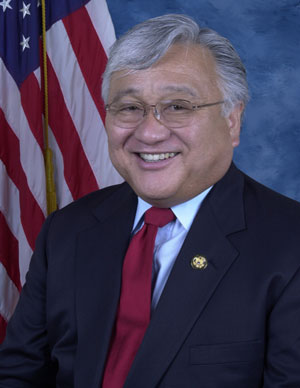Mike Honda is the senior Asian American U.S. Congressman from California, second in seniority only to David Wu of Oregon. As the representative for Silicon Valley, Honda’s interests align closely with those of Asian American tech professionals. And as a House Democratic Senior Whip and a member of the powerful House Appropriations and Budget Committee, he has built up the clout to represent those interests effectively.
During Honda’s first term — which began in 2001 — representing California’s 15th Congressional District he showed himself to be a clear voice for Asian Americans in Congress. In 2004 he was named Chair of the Congressional Asian Pacific American Caucus and held the post for seven years before passing it on to Congresswoman Judy Chu in January of 2011.
Honda knows personally the importance for Asian Americans of having a voice in Congress. His first memories are of life in one of the internment camps to which Japanese Americans were sent soon after the bombing of Pearl Harbor.
“Between the ages of one and almost five, I lived at Camp Amache — ironic given my father’s service in the US Military Intelligence Service,” recalls Honda. “One of the first lessons I learned was that being Japanese carried a negative connotation in America. My parents raised me talking about the injustices of camp, how it was a violation of the Constitution, and how Japanese Americans had been mistreated. The reason we were sent to camp is because no one in Washington said no. I’m here in Congress to make sure that never happens again to any community in America.”
Mike Honda was born in Walnut Grove, California on June 27, 1941. In August of 1942 his family was sent to the Granada Relocation Center (aka Camp Amache), the smallest of 10 internment camps with an eventual population of 7,318. Following their release in 1944, the family lived in Illinois for nearly a decade before returning to California in 1953. Honda’s parents worked as strawberry sharecroppers in San Jose’s Blossom Valley.
Honda began high school at Andrew P. Hill High, but transferred to San Josė High Academy from which he graduated. He entered San Josė State University in 1942. In 1965 Honda decided to interrupt his studies to join the Peace Corps after being inspired by President John F. Kennedy’s call for public service.
“I went into the Peace Corps as a college student one-credit shy of graduation and with little direction,” he recalls. “I emerged with the confidence that my emotional, psychological and physical limits had been pushed, plied and ultimately surpassed. I went into the Peace Corps speaking one language; I emerged speaking another: Spanish, a gift that introduced me to a new world, gave me a new way of understanding new cultures and helped me connect to constituents in California.
After two years in El Salvador Honda returned to San Josė State to complete his bachelor degrees in biological sciences and Spanish in 1968.
Honda began his 30-year teaching career in 1971 as a high school science teacher in the San José public schools. During this period he also returned to San Josė State to earn a master’s degree in education in 1974. He later served as a principal at two public schools and conducted educational research at Stanford University.
Honda’s first taste of politics came in 1971 when he was appointed to the San José City Planning Commission by Mayor Norman Mineta. In 1981 he was elected to the San Jose Unified School Board, then to the Santa Clara County Board of Supervisors in 1990. In 1996 he was elected to the California State Assembly where he served until beginning his first term as a Congressman in 2001.
From 2001 to 2006 Honda served on the Science Committee and the Transportation and Infrastructure Committee. In 2007 he was appointed to the powerful Appropriations Committee by House Speaker Nancy Pelosi. Honda was also named Regional Whip for Northern California.
Honda cultivated close ties with the Chinese American community. In May 2007 he became the first regular member of the San Francisco Lodge of the Chinese American Citizens Alliance not of Chinese ancestry.
In 2009 Honda was re-elected for a second term as DNC vice-chair. By virtue of his represenstation of Silicon Valley, Honda is also co-chair of the Democratic Caucus’ New Media Working Group. He is the original author of the Equity and Excellence Commission now housed in the US Department of Education.
“In light of my 30-year career as an educator and almost 10 years in the U.S. Congress, it surprises people to learn that I struggled as a student,” said Honda to explain his deep feelings about education. “I was shy to speak up. I failed classes. My empathy with English-language learners — and the unique obstacles they face — inspired me to get involved. I’ve learned that we as educators must do more to encourage students and provide each child with the education he/she deserves. That is why I created the Educational Opportunity and Equity Commission. This Commission focuses our country’s full attention on the needs of each child in order to reverse our low education rankings globally. Working with the Commission, I aim to fix this once and for all.”
Honda is widowed and has two grown children. Son Mark is an aerospace engineer and daughter Michelle is a public health educator in San Jose. Late wife Jeanne was a teacher at Baldwin Elementary School in San José before passing in 2004.

